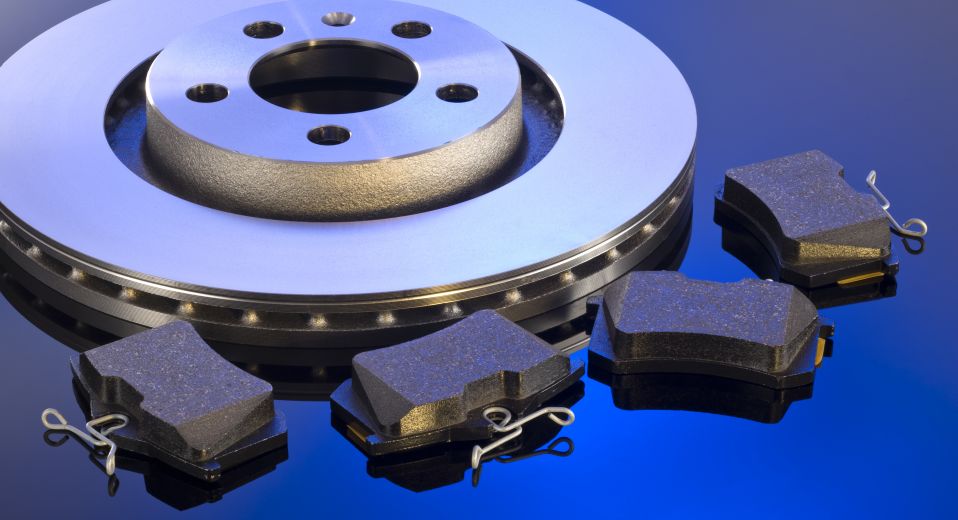There are many components that make up a fully functioning brake system, and it is something that will be checked at the annual MOT.
However, this is no guarantee that it won’t develop an issue before the yearly check-up.
Here is all you need to know about your brake pads, when to replace them, and how much it will all cost.
What are brake pads?
Brake pads are a critical component of the braking system in all vehicles.
They are designed to create friction against the brake discs and slow the vehicle down, eventually bringing it to a stop.
Brake pads are made up of a high-friction material, such as ceramics or metallic compounds. These materials are carefully chosen to provide efficient braking performance while minimising wear on the discs.
However, different types of brake pads have varying characteristics, such as noise level, durability, and heat resistance – and they all need to be checked by a trusted local mechanic to ensure you are safe when out on the roads.
Each wheel of the vehicle will have a brake pad, and if there is an alignment issue or you have issues with your vehicle that could impact your ride, then it is essential to sort out the wider problems with your vehicle along with the pads themselves.
Get a service or repair at home
RAC Mobile Mechanics can come to you, saving you the hassle of going to a garage.


Cost to replace brake pads
Typically replacing both the front and rear brake pads cost anywhere between £250 to more than £500.
According to whocanfixmycar, the average cost to replace the front pads is around £127, and another £121 for the rear pads.
The price can be significantly more if your brake discs also need replacing. For smaller vehicles, this can add an extra £150 to £250 – and for larger cars, this can start at over £200 extra.
To replace a brake the cost is around £440.
These prices are general estimates and do not consider labour cost, quality of replacements and location.
Source: whocanfixmycar, May 2025
How long do brake pads last?
Brake pads can last for a long time; however, the exact time frame can vary depending on several factors.
This will depend on the quality of the materials, maintenance of the vehicle, alignment of the wheels, driving habits, vehicle type, weather and driving conditions – amongst many other factors.
It is estimated that brake pads can last between 30,000 to 70,000 miles.
When do brake pads need replacing?
It's important to pay attention to signs of wearing or damage on your brake pads. Drivers should be concerned when they notice:
- Squeaking or grinding noises
- Reduced braking performance
- Pulsating brake pedal when any pressure is applied by foot
If you notice any of these signs, it is advisable to get this seen by a mechanic as soon as possible.
Should there be any damage, then you will need to get them replaced.
A mechanic will carry out a further inspection of the braking system to ensure that tyres, discs, or any components linked to the brakes are in perfect working order.
Over time, pads wear down due to the friction they generate during braking. It is essential to regularly inspect and replace worn brake pads to maintain the braking system's effectiveness and ensure safe driving.
In most modern vehicles, a digital wear indicator will inform the driver on their dashboard warning lights.
How often do you inspect your brake discs?
How to check brake pads?
To check if your brake pads are working properly, you can perform a visual inspection and pay attention to the following signs. However, if you are unsure, call a mobile mechanic or find a local garage who can carry out any necessary repairs.
Start by looking through the spokes of the wheel or remove the wheel, if necessary, to get a clear view of the brake components.
Once you have done this, you’ll need to check the thickness of the brake pads by looking at the pad material through the calliper or by feeling the pad surface. If the pads appear too thin or worn down, they may need to be replaced.
Some brake pads have built-in wear indicators. These are usually small metal tabs that will make contact with the brake disc when the pads are worn down to a certain level. If this is only appearing on part of the pad, then it is a sign of uneven wear.
Should you replace brake discs at the same time?
Like it is with all things related to wheels and tyres, although it is not always necessary to replace brake discs and brake pads at the same time, it is often recommended to do so for optimal braking performance and longevity of the braking system.
If you do not replace them at the same time, then it could cause uneven wear or damage on the rest of the braking system.
It could also impact the overall performance and efficiency of the vehicle.
When you get a car repair, there are often fees for carrying out the work by the mechanic.
Although getting them all replaced at the same time might be more expensive, it saves having to come back multiple times – saving money in the long run.
- 10 driving habits that are secretly damaging your vehicle
- Autonomous Emergency Braking – what you need to know
- MOT advisories – a guide on what to do next
Need your brakes repaired? Get them done by an RAC Mobile Mechanic.
Electrical issues?
If your car battery keeps dying or electrical systems are acting up, it could be a faulty alternator. Book an RAC Mobile Mechanic today.












